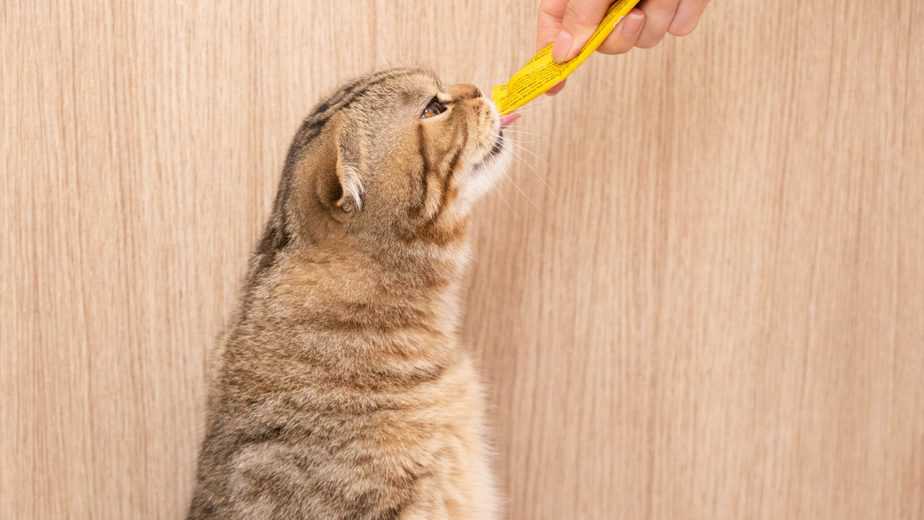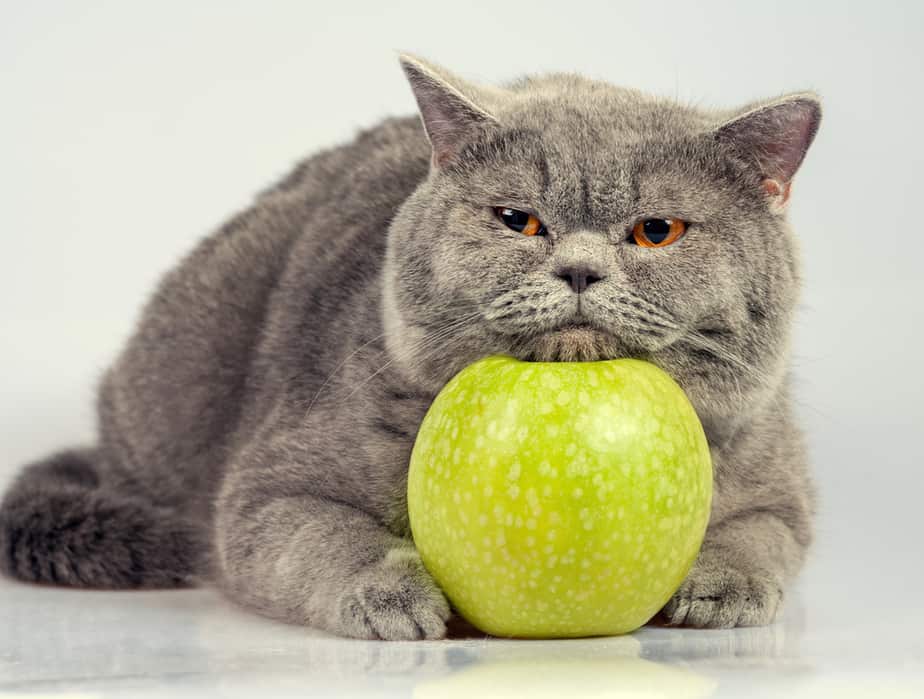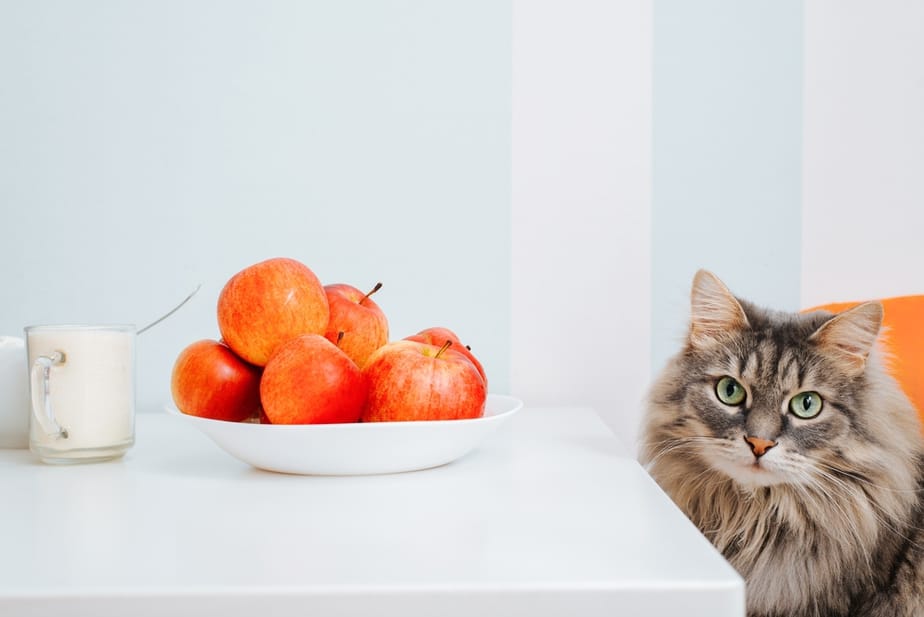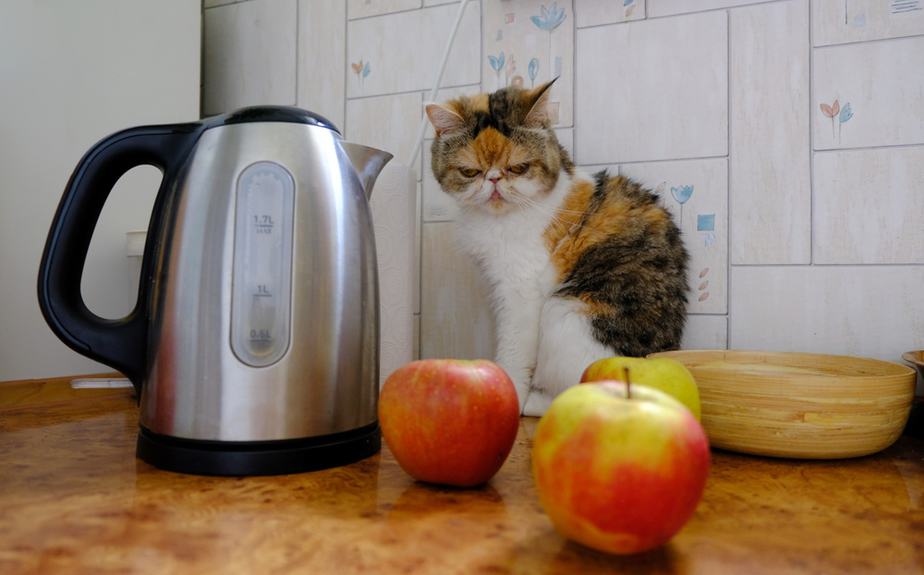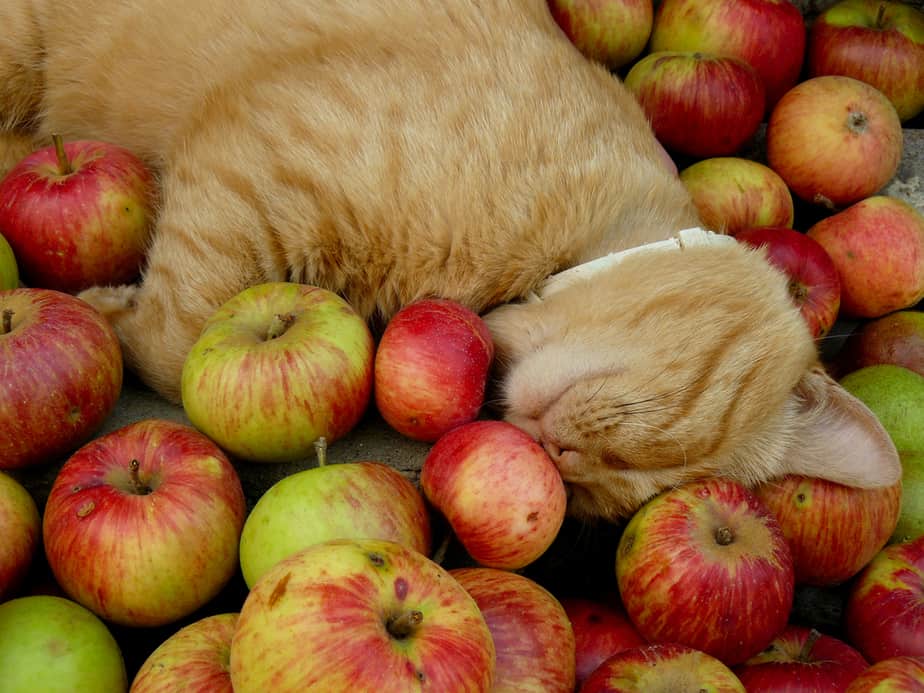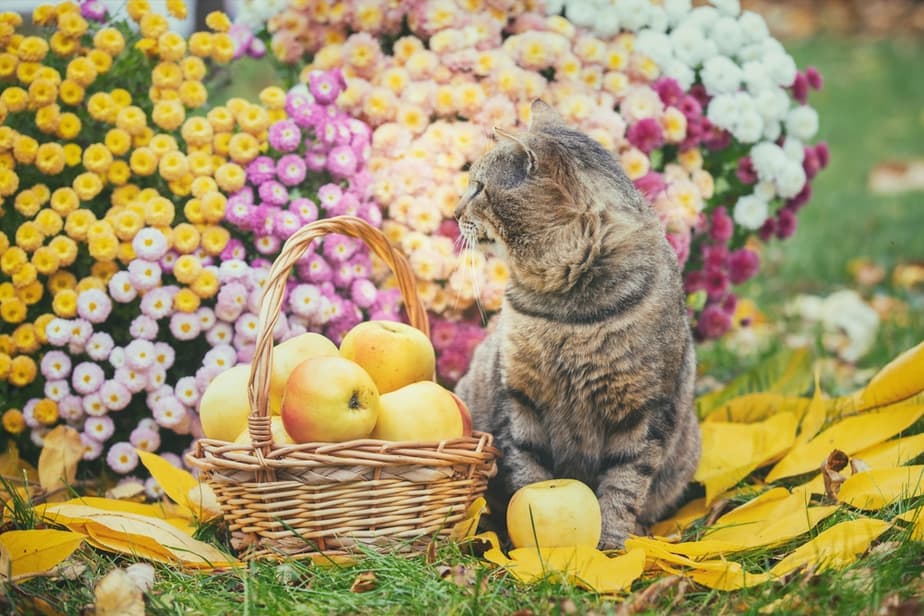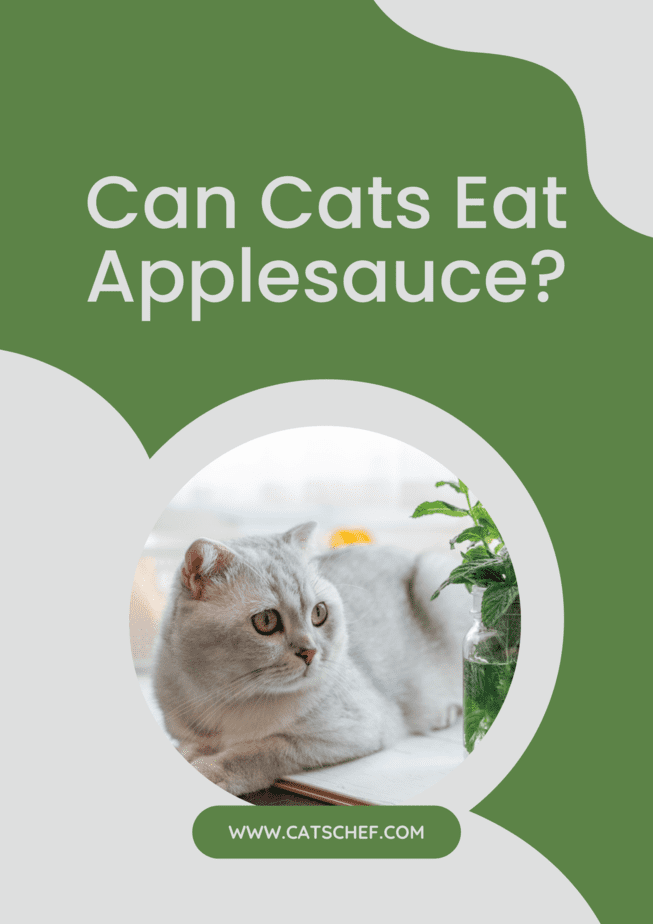📖 Table of Content:
If your feline friend is anything like mine, she might be scrunching up her snoot every time she catches a whiff of something you’re cooking. Felines are curious creatures so it’s no wonder she’s interested in trying anything she can put her fluffy paws on. But can cats eat applesauce?
After all, apples are perfectly safe for cats. You can cut them into cubes or slices, and offer them to your picky eater as a delicious and nutritious treat. They’re high in calcium, vitamin C, vitamin K, and pectin. And they’re unlike any other fruit as they offer the same health benefits to cats as they do to humans!
It makes sense to assume that cats can eat applesauce, too. You always have a pouch or two hidden somewhere in the kitchen. It would be so easy to open one for your precious purrincess every time she’s acting out and begging for a treat.
While the main ingredient in applesauce is apples, you should be mindful of the amount of sugar, additives, and preservatives most fruit sauces contain. Don’t get me wrong, applesauce isn’t toxic to cats, and consuming it shouldn’t cause any adverse reactions.
However, that doesn’t mean that you should include it in your cat’s regular diet. If your feline friend’s a big fan of fruit sauces, you can use applesauce as an occasional treat. There are a couple of things you need to take into consideration, though, so let’s dive in!
Do cats like applesauce?
First things first, applesauce is a sauce made from apples. Apples are skinned (or unskinned) and ground into a liquid consistency. It’s typically sweetened with sugar, honey, or maple syrup. It’s not unusual to include other flavourful ingredients like cinnamon or nutmeg.
That sounds delicious, but here’s the catch – cats can’t taste sweet things. They lack sweetness receptors that prevent them from enjoying sugary treats most of us can’t live without.
So, if your mischievous monster starts showing interest in applesauce, she’s either doing it out of sheer curiosity or she’s enjoying the gravy-like texture. Let’s be honest, your cat would munch on dirt if she thought it looked like the most delicious gourmet meal.
Cats might like applesauce, but that doesn’t mean they should eat it. The biggest problem with this fruity treat is that the commercially available applesauce contains heaps of additives and preservatives. That’s not something you want in your precious pet’s belly!
Some brands use a lot of ingredients in their sauces and you should feel free to leave those on the shelf. Don’t worry, because there are plenty of other brands that use fewer ingredients in hopes of making their products healthier and accessible to everyone. Fewer ingredients are always better in the feline world!
Cats can eat all-natural applesauce with no additives and preservatives, but… Those are really hard to find. If you’re still wondering whether cats can eat applesauce safely, here are a couple of risks and benefits that might help you make the final decision.
Risks of feeding applesauce to your cat
If you’re planning on sharing a pouch of yummy goodness with your precious pet, you should take a couple of things into consideration. While apples aren’t toxic to cats, applesauce can contain different ingredients that might harm your cat in the long run.
1. Applesauce is rich in sugar
Believe it or not, 100 grams of applesauce contains around 15 grams of sugar. Cats are carnivores which means they require a protein-packed diet. They thrive on meat and animal-sourced vitamin, minerals, and antioxidants.
Cats don’t require fruit in their diet, and their digestive systems aren’t designed to break down carbohydrates. If your feline friend accidentally eats too much applesauce, you might be in trouble. Too much sugar can lead to discomfort, excessive thirst and urination, diarrhea, and vomiting.
Not only that, if you include applesauce in your cat’s regular diet she might experience serious health problems in the long run. Weight gain, tooth decay, and diabetes are only some of the issues that might arise from letting your cat consume too much sugar.
2. Applesauce contains additives and preservatives
Most commercially available applesauce doesn’t even fall under the healthy category. You might think your precious purrincess is eating high-quality apple puree and gaining all the nutritional benefits, but she isn’t. All she’s gaining is unnecessary weight!
Apart from sugar, applesauce typically contains a bunch of additives and preservatives. These two ingredients refer to any substance that’s added to change the sustenance at hand in some way. Meaning they extend shelf life, improve taste and appearance, and even act as nutritional supplements.
With all that in mind, can cats eat applesauce? No! You shouldn’t feed applesauce to your cat unless you’re one hundred percent positive it doesn’t contain any additives and preservatives!
3. Apple leaves, twigs, and seeds are toxic to cats
This universally loved fruit isn’t toxic to cats, but… You should be extra careful when trying to introduce it to your cat’s regular diet. You should always consult with your vet before making any significant changes and decisions.
Believe it or not, apple leaves, twigs, and seeds contain cyanide! You need to know that cyanide is a potentially deadly chemical. In this particular case, pits and seeds of various fruits (apricots, apples, and peaches) contain substantial amounts of chemicals which are metabolized into cyanide.
While most commercially available applesauce shouldn’t contain anything other than the apple flesh, you can never be too careful. You have no control over what goes into those pouches, so it’s better to avoid prepackaged fruit sauces altogether.
Benefits of feeding homemade applesauce to your cat
Believe it or not, the biggest culprits of applesauce are sugar, additives, and preservatives. Get rid of them and you’ll get the most mouth-watering treat for your precious purrincess! If she loves munching on this delicious sauce, you might want to look into making it from scratch.
Homemade applesauce is completely safe for feline consumption! Not only that, it’s packed with vitamins, antioxidants, and fiber which can do wonders for your cat’s digestive system. Since it contains some water it can also help keep your cat’s hydration levels in check.
1. Applesauce is packed with vitamins and minerals
If you provide her with an occasional applesauce treat, your boisterous beast might benefit from heaps of vitamins and minerals such as vitamin A, vitamin B6, vitamin C, potassium, calcium, and magnesium. While cats do get most of their nutrition from animals, it doesn’t hurt to add some more!
Vitamin A supports your cat’s immune system and contains well-known antioxidants. It helps to protect your cat’s body against cancer formation, vision deterioration, and other diseases. Vitamin B6 is the driving force behind the production of your cat’s red blood cells.
Vitamin C has an important physiologic role in various metabolic functions including proper tissue growth and maintenance, oxidative stress relief, and (you guessed it) immune system regulation.
Lastly, potassium, calcium, and magnesium regulate the fluid concentration in your cat’s body, help with urinary disorders, and help prevent kidney disease (as well as other renal disorders). It’s safe to say that homemade applesauce really packs a punch!
2. Applesauce is rich in fiber
While it’s difficult to talk about homemade applesauce nutrition facts, 100 grams of applesauce should contain around 1,2 grams of fiber. Trust me, this is a great amount for your feline friend as cats shouldn’t consume too much of it (unless you want her to run to her litterbox all the time)!
Carbs are evil, but… Fiber is a type of carb that isn’t digested by a cat’s gastrointestinal tract. It’s incredibly important for your cat’s health because it helps with all sorts of digestive functions. It improves the stool quality in constipated cats as it provides bulk to let food move through.
It’s safe to say that homemade applesauce can be your cat’s best friend when you learn how to use it responsibly. Don’t include it in your cat’s regular diet, but do use it as an occasional healthy treat. Your precious purrincess might not taste the sweetness, but she’ll appreciate the texture!
3. Applesauce can keep your cat’s hydration levels in check
Have you ever noticed the hatred cats feel towards water? That look of utter disgust whenever they catch a glimpse of their water bowl is priceless. Not to mention the fact they always forget to drink out of it! Chances are your cat’s hydration levels aren’t in check, and that’s where applesauce can step in.
Since it contains lots of water, you can use applesauce to trick your feline friend into being more responsible with her hydration levels. It’s quite a delicious way of introducing more water into her regular diet.
One thing to keep in mind – you should be careful with the amount of applesauce your cat consumes. Homemade applesauce doesn’t have to contain any added sugar, but you shouldn’t forget about the natural sugars that come from apples. Your precious purrincess needs some fresh water, too!
How to make homemade applesauce?
This is the best time to answer the age-old question ”Can cats eat applesauce?” Cats can eat applesauce if you make it from scratch! It’s the best way to ensure your feline friend gets the highest quality treat with no additives and preservatives. Here’s a great recipe you can use!
Ingredients
Three large apples (Gala, Red Delicious, or Granny Smith);
Two tablespoons of honey, maple syrup, or some other cat-friendly sweetener;
One cup of water.
Directions
Peel and slice your apples, and remove the leaves, stems, and seeds. Put them in a pot and add your water and honey/maple syrup. Cook for two hours, or until they have completely softened. Remove them from the pot carefully, put them in your blender, and blend until you get a smooth consistency. Voila!
Don’t forget! Commercially available applesauce isn’t good for cats as it contains heaps of sugar, additives, and preservatives. If you’re wondering whether cats can eat prepackaged applesauce, the answer will always be no.
On the other hand, homemade applesauce can be your savior. If your feline friend’s a big fan of the gravy-like texture, you can always throw a couple of apples in the pot and make it from scratch. Use it as an occasional treat, and your cat will love you forever!
